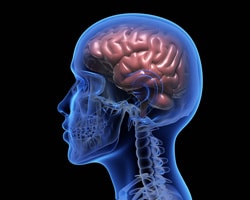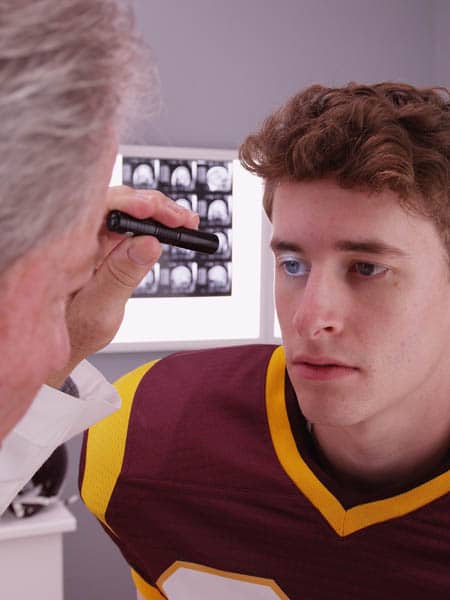Visual Problems can Result from an Injury to the Brain
With all the emphasis on brain injury, including concussion in NFL football players, there is one aspect of a traumatic brain injury that is often overlooked. Visual problems can result from an injury to the brain. These problems are too often missed during initial treatment of the injury. This oversight can result in increased rehabilitation time, and can even impair the rehabilitative process.
Some of the symptoms associated with a brain injury that may indicate a vision problem:
 Blurry or out of focus vision, or double vision
Blurry or out of focus vision, or double vision- A sensitivity to light that was not there previously
- Problems reading, such as the words appearing to move about the page
- Difficulty comprehending what you’re reading
- Difficulty paying attention or concentrating
- Trouble remembering
- Aching feeling in one or both eyes
- A decrease in your visual field, such as a loss of peripheral vision
Visual Skills We All Need
When our visual system is not functioning properly, more energy is required to do even the easiest of tasks, making normal functions seem more difficult.
Some of the visual skills that can be affected by a traumatic brain injury include:
- Tracking: our eye(s) may not move smoothly across a printed page or when trying to follow a moving object
- Fixation: maintaining eye contact
- Focus change: quickly switching our visual focus from far to near, and back without blurring
- Depth perception: judging how far or near objects are
- Peripheral vision: observing and interpreting visual input from the surrounding field of vision
- Binocularity: both eyes working together as a team
- Visualization: picturing images in our “mind’s eye”
- Visual perception: understanding what we’re seeing

Vision Therapy and Rehabilitation
Health care professionals have made amazing advances in the treatment and rehabilitation of injuries caused by trauma to the brain. Unfortunately, too few health care professionals are sufficiently trained in the recognition and diagnosis of visual problems related to a traumatic brain injury. This lack of awareness regarding the visual-perception consequences of such an injury can leave a gap in the rehabilitative services. This can, in turn, leave the patient inadequately treated for his or her injury, resulting in incomplete rehabilitation and frustration for the patient, the family and the treatment team.
This is why the vision care professional is a vital part of the rehabilitation effort. Vision therapy and the proper use of lenses, administered under the care of a behavioral or developmental optometrist, can help to improve the transmission and processing of information between the eyes and the brain.
Vision Therapy can Improve a Person’s Quality of Life
Vision therapy can be both practical and effective when used as part of a rehabilitation program. There will be an initial evaluation, examination and consultation with the trained optometrist. This will determine how information is being processed by the injured person, and can pinpoint the person’s weaknesses and strengths. The optometrist can then develop and prescribe a treatment program that may include the use of prisms and lenses, aides designed for low vision and specific exercises. This program of treatment is designed to improve a person’s control of his or her visual system and to increase his or her vision efficiency. As a result of improvement in visual processing, the person’s ability to perform activities of daily living can improve.
Developmental Optometry or Behavioral Optometry
The core principal of behavior optometry or developmental optometry is that vision is a process we learn, and it can be developed, enhanced, rehabilitated, or relearned regardless of the patient’s age. The continued education beyond the basic Doctor of Optometry (O.D.) degree emphasizes the use of lenses, prisms and vision therapy to improve a patient’s visual capabilities. These treatments can work to reduce visual stress, and prevent or rehabilitate vision problems. The behavioral optometrist works as a member of the rehabilitation team, bringing his or her experience in treating vision problems associated with traumatic brain injury to the overall treatment program.
CONTACT US
Vision Care & Therapy Center

Dr. Janna Iyer, FCOVD
Dr. Alayna Larsen
11735 Pointe Place
Roswell, Ga 30076
678-256-3990
Office Hours
Mon-Thu 9:00am-6:00pm
Fri 9:00am-1:00pm
Appointments
678-256-3990
Patient Infomation


